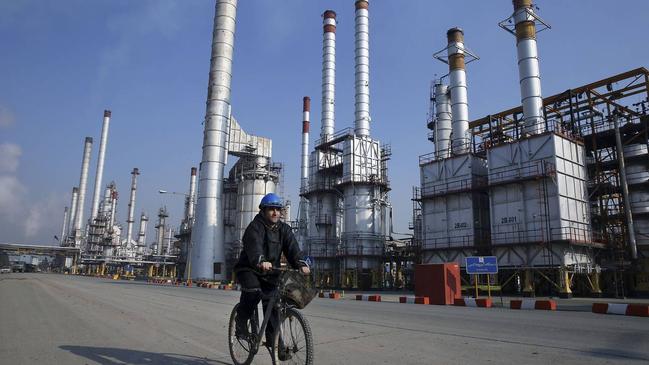Oil price spikes on Middle East tensions, Israel response to Iran key to market moves
Oil prices have surged on escalating tensions in the Middle East, amid fears a deeper conflict that draws in Iran would crunch global supplies.

Business
Don't miss out on the headlines from Business. Followed categories will be added to My News.
Oil prices have spiked on escalating tensions in the Middle East, amid fears a deeper conflict that draws in Iran would crunch global supplies.
Iran’s missile attack on Israel early on Wednesday, Australian time, sent oil prices higher, with the Brent Crude benchmark trading at close to $US75 per barrel late on Wednesday, up from less than $US71 just before the attack.
While the immediate market reaction returns prices to where they were just a week ago, following a six-month decline prompted by weaker global demand and increasing production, there are fears Israel’s response could disrupt supplies in Iran – the world’s seventh-largest oil producing nation.
AMP chief economist Shane Oliver said the scale of Israel’s response, and the potential impact on Iran and other oil-producing nations in the region, would determine whether prices would trend higher over coming weeks.
“You’ve seen this knee jerk reaction so far – the real issue is whether Iranian and others’ oil supplies will be disrupted,” he said.
“At the moment, much depends on Israel’s response. If it’s a measured response, as was the case back in April, then it’ll all quickly settle down again, the conflict around Israel will continue, but investment markets and the oil price will go back to focusing on other things.
“If, alternatively, Israel responds with an attack on Iranian nuclear facilities or Iranian oil facilities, then the impact would be far more significant and much more lasting. If that were the case I think today’s 5 or 6 per cent rise in the oil price will be a non-event.
“You’re talking about 20 per cent-plus rise in oil price if Iranian production is disrupted and Iran then disrupts other countries.”

Oil prices retreated in the week leading up to Iran’s missile attack, on rumours that Saudi Arabia was planning to raise output from December, and as Libya restarted production following a month-long shutdown caused by a dispute between rival political factions.
The latest oil price surge sent energy stocks higher on Wednesday, with Woodside up 3.1 per cent at $25.91, Santos rising 2.4 per cent to $7.17 and Beach Energy up 4.6 per cent to $1.25.
The conflict between Israel and Hamas has been raging for close to a year, but it’s the direct involvement of Iran and other oil producing nations in the region that threatens to destabilise global supplies.
Iran supplies about three million barrels a day – or about 3 per cent of global output – despite Western sanctions. It also borders the Strait of Hormuz, through which about 20 per cent of the world’s oil supply transits from Gulf producers including Saudi Arabia, Qatar, Kuwait and the United Arab Emirates.
MST Marquee senior energy analyst Saul Kavonic said any threat of disruption to the flow of oil through the narrow channel would have a significant impact on prices.
“Up to 20 per cent of global oil and LNG supply is at risk if passage through the Strait of Hormuz is impacted,” he said.
“This would present over three times the market impact of the oil price shocks in the 1970s, in the wake of the Iranian revolution and Arab oil embargo.
“This scenario could send oil and LNG to record highs that exceed the global energy crisis in 2022. Oil markets may be shaken out of their complacency soon as the conflagration of the Middle East conflict directly engulfs Iran.”

Mr Kavonic said the more immediate threat of disruptions to Iran’s oil exports – either via an attack on infrastructure or through tighter sanctions – could send oil prices closer to $US100 per barrel.
Prices peaked at more than $US120 in the middle of 2022 in the wake of Russia’s invasion of Ukraine, production cuts and heightened global demand.
Dr Oliver said that while fluctuations in oil prices normally took about two weeks to flow down to petrol prices paid at the pump in Australia, it was unlikely the most recent increase would have a material impact.
“Last week’s fall (in oil price) is yet to flow through, so you could argue this week’s rebound, which just takes us back to where we were at the start of last week, will come out in the wash in the great scheme of things and there won’t be much impact,” he said.
“Where there can be an impact though, is when there’s a lot of headlines around events in the Middle East, talk of higher oil prices – you tend to see less discounting, and the petrol price ends up being higher, even though it’s not justified by the oil price, because petrol companies think they can get away with it.”
More Coverage
Originally published as Oil price spikes on Middle East tensions, Israel response to Iran key to market moves




